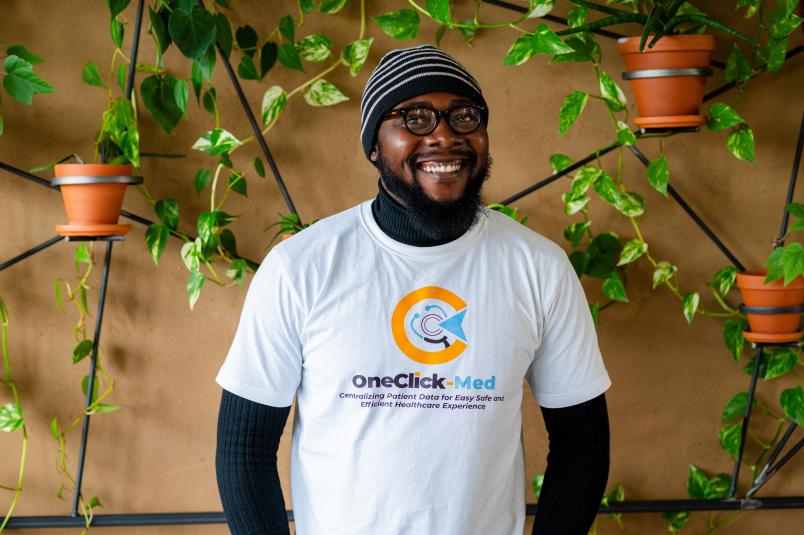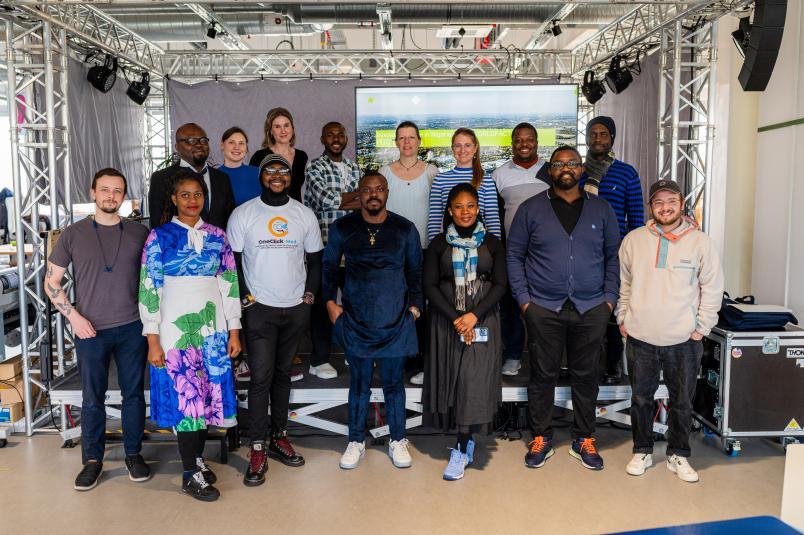Start-ups
“It won't be a walk in the park, but I'm determined to make it happen”
Motivated by two life-changing experiences, Reagan Rowland embarks on a journey to change the Nigerian healthcare system. Through the WIN NRW.Afrika program, his idea came to Bochum.
Health data is important for quick and efficient medial treatments of patients. At the same time, the processing of sensitive data is associated with many risks and technical hurdles – both in Nigeria and in Germany. With OneClick-Med Reagan Rowland has founded a healthcare start-up that intends to revolutionize the Nigerian healthcare system. The healthcare platform has the potential to eliminate diagnosis and medication errors, reduce repetition of tests and procedures, and foster interoperability within the healthcare ecosystem.
As part of the ”Innovation Made in Nigeria meets WORLDFACTORY” program, a cooperation of Worldfactory International with the GIZ Regional Office Germany-West within the WIN NRW.Afrika programme, he and nine other promising start-ups from Nigeria visited the WORLDFACTORY Start-up Center from 9 to 11 April 2024. In the final competition at RUB Makerspace, OneClick-Med emerged first place. “Your idea has great potential for Germany”, said the jury. In this interview, Reagan Rowland talks about the decisive turning points in his life, how his stay in Bochum helped him on his path and why this won't be his last time in Germany.

I grew up understanding what it means to be responsible for others.
Mr. Rowland, can you tell us something about where you grew up?
I am from a small community in Nigeria, called Dagbala, located in the heart of Edo State. Being the eldest of four brothers, I grew up understanding what it means to be responsible for others. My brothers always looked up to me and I had to make sure that everyone followed the rules our parents laid down for us.
And how did your career begin?
I completed my first degree in computer science at the university of Abuja. As I aspire to be in the political space, I went on to do my master’s in International Relations and Diplomacy. Although I did a little bit of programming, I quickly figured out that programming wasn’t my thing. I was more of an administrative type of person in IT, more of a manager. Therefore, I went into enterprise resource planning. Since 2020, I have been working for the National Action Committee for the African Continental Free Trade Area (NAC AfCFTA) as an Information Technology Coordinator. The AfCFTA agreement is an association of 54 of the 55 African states that trade freely with each other, similar to the European Union (EU).

The idea first came to my mind in 2016, after I almost lost a friend, whom we had rushed to the hospital after he collapsed.
When did you first have the idea for a medical healthcare platform?
The idea first came to my mind in 2016, after I almost lost a friend, whom we had rushed to the hospital after he collapsed. Although it was a life-threatening situation, it took more than thirty minutes until he could see a doctor because of administrative paperwork and tests. I remember being so furious with the nurses in the hospital because I couldn’t understand why they couldn’t stabilize him first before doing anything else. Later, I realized that it wasn’t the nurses’ fault but rather a problem of the infrastructure. Time could have been saved if the doctors had access to my friend's medical history. Luckily, my friend survived, but I decided to create a medical healthcare platform that would streamline accessibility, reduce errors and eliminate waiting time for patients through just one single registration.
In the same year, I got into a Nigerian start-up program, but unfortunately, I didn't receive the necessary funding to start my own business. I then started a family in 2017 and dedicated my life to them for the next five years.
Five years go by, what made you think about your start-up idea again?
In 2020 at the peak of Covid-19, my wife was having our second son by c-section. Unfortunately, there were some complications and the doctors needed to know more about her medical history to inform their next decision, but I couldn’t provide accurate information. I was forced to call her family, causing a lot of anxiety. She, too, survived. My mind immediately flashed back to my start-up idea, knowing fully well that it was the same infrastructural gap. That’s when I said to myself: this issue must be solved. Finally in 2022, I started researching, put a team together, attended entrepreneurial trainings and in 2023, we were able to start working properly.

Our goal is to transform healthcare in Africa into a more efficient, accessible, and patient-centred system.
What is the idea behind OneClick-Med?
OneClick-Med is a software-as-a-service (SaaS) health tech platform, that centralizes patients’ registrations and data for easy, safe, and efficient healthcare experiences. We are solving the problem of diagnosis and medication errors, repetition of tests and procedures, traditional ways of collecting and storing healthcare data, and most importantly, interoperability within the healthcare ecosystem. Our goal is to transform healthcare in Africa into a more efficient, accessible, and patient-centred system.
So, OneClick-Med centralizes healthcare data. Are you also offering any other features?
Yes. Other features include an “AI-based symptom checker”, which lists the probable causes of each of your symptoms, because not every headache is a fever or malaria. It will recommend the best cause of action for you, reducing the rate of self-medication.
We also have an “AI driven prescription reminder”, reminding you to take your drugs or get a refill, “emergency care and response”, through which you can request an ambulance from wherever you are and two blogs, dedicated to preventive healthcare and first aid.

We know that data privacy and security have to be the top priority on our list.
How do you plan to protect patients’ sensitive health data?
Our security measures are built in from scratch, because we know that data privacy and security have to be the top priority on our list. Data can only be shared with the healthcare facility or professional with the patient’s permission. The platform is designed in such a way, that no one can access your data without your permission. In case of an emergency, when the patient is unable to grant access to their medical record, a doctor can bypass the approval and view the patient’s record. However, this will be recorded on the patient’s and doctor’s platform. We are HIPAA compliant, and we are implementing worldwide recognized standards for data capture and date management. Additionally, we use have end-to-end encryption.
Why did you decide to participate in WIN NRW.Afrika and come to North Rhine-Westphalia?
In many parts of Africa, start-ups are not as well supported as in Europe. The German government supports entrepreneurs in a way that makes building a start-up fast and easy. In Africa, we have to double down our efforts, and once people can see actual results, that’s when the interest starts to grow. Participating in the program meant possible partnerships, collaborations and maybe future funding. And indeed, I met a start-up I want to collaborate with, that sells period wears. It’s a great opportunity to be here, to connect with a group of like-minded people and collaborate with people who are progressive and enjoy their support.

Everything I’ve learnt here, I also want to bring back to Nigeria to impact younger start-ups.
Are there any similarities between your start-up ecosystem and the one in Bochum?
There are lots of similarities, for example the incubators.The events are also similar, although I'd even say that the events are a little bit more efficient in Nigeria. We don't have difficulties attracting big businesses to our start-up events. You can meet managers, and someimes CEOs, who have passion for start-ups, and experienced people and amateurs can exchange knowledge.
One thing that’s missing from the Nigerian ecosystem is government support. However, with the new government under President Bola Ahmed Tinubu, there’s a growing interest in investing in and supporting start-ups. New initiatives aim at building Nigeria’s technical talent backbone to power our digital economy. Everything I’ve learnt here, I also want to bring back to Nigeria to impact younger start-ups.

The Worldfactory Start-up Center had a great impact on me. I attended many workshops on different aspects of entrepreneurship.
What impressed you the most during your time here?
It’s definitely not only one thing, but the Worldfactory Start-up Center had a great impact on me. I attended many workshops on different aspects of entrepreneurship, gaining new perspectives. Two other memorable experiences were visiting the production line of Mercedes Benz and Wilo. When I walked into Wilo, I said to myself, “Reagan, OneClick-Med has to get this big.” The program showed me, that I’m not wasting my time, that I need to continue on my path and that it’ll only be a matter of time until I’ll see the impact on society, on the country and Africa at large.
What are your plans for the future?
It’s simple, I want to finish development. OneClick-Med needs to go to market. I want people's problems to be solved. I want to hear people say in the future, “Thank God, I had the OneClick-Med app.” I also have my eyes set on Germany. Just because the General Data Protection Regulation (GDPR) is very strict at the moment, doesn't mean that we can't readjust our app in the future. We also have other functionalities that can be integrated in Germany, for example the symptom checker or the prescription reminder. I know it won't be a walk in the park, but I'm determined to make it happen.
In the end, if everything succeeds –
When! In the end, “when” everything succeeds, not “if”. I'm very careful with my word choice, because words are powerful. They go out into the world and connect with the universe. They attract the things you say. So, I don’t use “if” but “when”, because I’m certain it’s only a matter of time.
Innovation Made in Nigeria meets WORLDFACTORY
About the WORLDFACTORY

